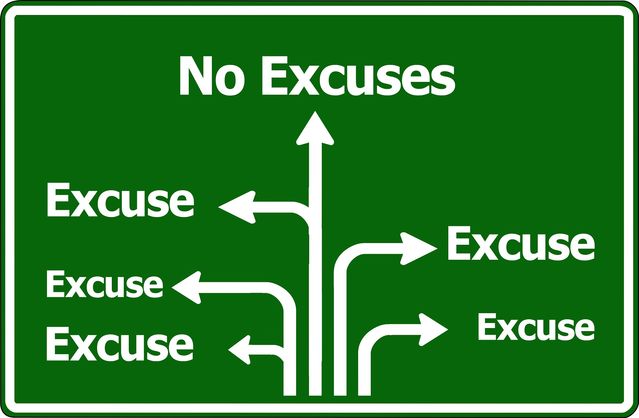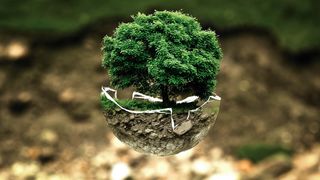Environment
Top Excuses for Trashing the Planet (and Other People)
What excuses do we make to avoid being kinder to the planet?
Posted December 31, 2016

You’ve heard most of these before.
“It’s all going to hell anyway.”
“Climate change is already happening, there’s no way to stop it.”
“The problem is overpopulation.”
“Nothing I can do as an individual will make a difference. It’s the decisions and interests of elites in corporations and government that matter.”
“My actions are tiny compared to the size of our environmental/social problems.”
“Everyone else is doing the same.”
“I just don’t know what to do. These problems are so overwhelming and confusing!”
As an environmental scholar, I hear them all—at parties, from people I meet in random places, from friends. On the face of it, they seem like plausible explanations for inertia—to not change a thing in one’s personal or political life.
And it’s not just the masses—informed people, even environmental scholars (and even I sometimes) use some of these same excuses to avoid changing the course of the runaway locomotive we seem to be riding. We know our climate systems are entering chaos, we know we’re contaminating our bodies and nature, we know resources are dwindling and forests are disappearing, we know we’re in Earth’s sixth great extinction event—this one caused by human activity, but we continue to grease the skids and keep the destruction happening with our everyday choices.
The excuses are the grease that keeps it all going. But how do we know they’re just excuses? By how easy they are to debunk.
No, it’s not all going to hell.
Yes, we’re badly damaging Earth’s ecosystems, but we’re far, far away from total, irrecoverable destruction. The vast majority of the planet’s functions remain intact. There’s a lot of beauty to love and save. This planet still nurtures us. Let’s nurture it back.
Climate change is not a done deal.
Yes, climate change is happening, and some damages are set to take place, but we are far, far away from the point at which nothing we do matters. Actually, everything we do matters. Climate change is not an all-or-nothing phenomenon. Every emission of carbon dioxide into the atmosphere we do today is just as bad as the same emission two decades ago and has about the same consequences. Similarly, every improvement we make today—from green energy to less meat eating—will benefit the planet and people (mostly less wealthy people) somewhere on Earth, today or in the future. This really matters because, as I’ve written before, as many as half a million people are already dying each year as a result of global climate change, some communities are having to give up their homelands, and if we don’t act coastal cities may be submerged as early as the end of this century, while many of today’s infants are still alive.
No, “the problem” is not overpopulation.
That simple formula holds everything else in the more industrialized parts of the planet—consumption level, lifestyle, types of technology deployed, and so on—at a constant as if they’re unchangeable. Certainly, if everyone on the planet were to live like a typical American today, with our level of resource consumption, environmental decline would accelerate to dizzying levels. The planet simply cannot support the current number of people at the average global wealth level, so yes it certainly would be easier and less damaging to have a smaller global population at these consumption levels.
BUT even at one tenth of Earth’s current population, if everyone on the planet were to live at the consumption levels of, say, Donald Trump, the planet would be devastated in a couple of decades certainly. Conversely, if we all lived within the consumption levels of the average Bangladeshi, the current population of Earth would likely be sustainable for centuries. It’s more complex than “overpopulation is the problem.”
Nothing you can do as an individual matters? Really?
Why sell yourself so short, make yourself so miniscule? Actually, most people reading this article wield a level of material wealth (and thus environmental power) that outstrips all but royalty throughout human history before the 19th century. Your life matters, literally. Even though, as I explain extensively in my book Invisible Nature, the consequences of your life take place elsewhere, outside of your realm of experience—because they’re distributed around the globe by modern transportation and telecommunications technologies—your actions certainly are making an impact on the planet and other people. All your decision making—to buy this unnecessary product or to instead reduce your material consumption and go for a walk in nature—has a significant impact on the planet. You’re a planetary actor. You wield great power. So it’s sad and ironic to say what you do doesn’t matter.
Your actions are tiny compared to the size of the problems, you say?
Ditto what I just wrote above. Your actions are not tiny. Your actions in this modern world, when viewed with all their attendant consequences—the felling of trees, the manufacture of cars, the slaughter of cattle for your food—would seem like the actions of a god to people in most human societies before a few centuries ago. Appreciate that and take responsibility for your impacts. And then use that knowledge as inspiration for conscious, intentional decision making that aligns better with your values (which perhaps include a healthy planet; healthy, secure people; and a sustainable society).
No, not everyone else is doing the same, and so what if they were.
Are you content to be a follower? A lemming? Why not take up the challenge and forge your own path. It’s harder, and you may be challenged by others—or just seen as a downright curiosity—but charting your own more benevolent course is infinitely more rewarding. If you’re an American, remember the mavericks that founded your country. They didn’t simply follow examples set by others. Why not be a leader? Are you up to it?

It’s completely sensible that you “just don’t know what to do” because the environmental and other problems you read about seem so overwhelming and unrelated to you and your life. People often ask me how they can make a difference. Just recently, in a public email a fellow faculty member at one of my institutions asked me what people could do to mitigate environmental damages and work toward a more ecologically prosperous planet. I close this post with my response to the faculty (edited a bit):
- Amplify your efforts by joining together with others. Build community around environmental thought and action. Mutually support friends and family members in transitioning to a more ecologically conscious life. For example follow the Northwest Earth Institute's guide to create a self-guided course for yourself and like-minded people in your community (http://nwei.org/organize-course/, includes a link to a guidebook). Join an organization such as a local chapter of the Citizens’ Climate Lobby. Doing so can shift your actions from feeling like chores or obligations to communal fun and enrichment.
- Dare to utter your concern for the environment and social equity in mixed company. The global environmental crisis, including global climate change, have become sublimated and stifled in everyday conversation (partly because we all know that environmental damage is just our next purchase away). It continues because of our silence. Your concern, gently expressed, will become contagious and help to normalize action congruent with that concern (and de-normalize destructive practices that are routine in our lives). Realize that we cannot all suddenly have perfectly sustainable lives. We're all conflicted, and what’s needed is a long process of change.
- Be more politically active around the environment and social justice. These first three items focus on social action rather than individual, consumption-based action because the scale of our problems need more than change in the private realm. Political action can be as little as writing to your elected representatives to seek better protection for nature, with respect to particular issues and legislative bills. Example: Right now, people are gathered around the construction sites of the Dakota Access pipeline struggling for all of us. If you'd like to help them protect the waters, support them with phone calls to elected representatives to get the pipeline stopped. Withdraw your investments in the fossil fuel industry. Particularly with the ascendance of a global climate change denier (and all his other deleterious values) to the top of our federal government, political action is now more important than ever. Elected representatives often do in fact respond to constituent pressure.
- But don't stop there—support environmental and social justice organizations doing the hard work. They sometimes wield more protective power than government (see this uplifting article, for instance: "The Inside Story Of How Greenpeace Built A Corporate Spanking Machine To Turn The Fortune 500 Into Climate Heroes"). Research and pick your favorite organizations to support. Do this as a service not just to others but to yourself and your own integrity, growth, and satisfaction. Because the laws and the courts can be a major bulwark against environmental damages, organizations that will play an important role in protecting the environment in coming years include Environmental Defense Fund, Earth Justice, and Natural Resources Defense Council (all highly rated by Charity Navigator). Consider also Greenpeace, the Sierra Club, and others.
- If you teach, insert concepts and ideas about nature, the environment, or sustainability into your courses—every course, every semester, not just once—at least a tiny bit. If you teach advanced calculus, find a problem in sustainability to which such tools can be applied; there must be one. If you teach music, study nature-loving lieder or assign music composition projects to be inspired by nature or nature defenders. Environmental studies and sustainability touch nearly every facet of life. Bringing them into the classroom or the church normalizes them and sends a powerful message to students and others.
- Work at the institutional level: support sustainability efforts at your company, agency, or campus.
Now easier, personal changes and actions, starting with the most effective...
- Eat less meat, more plant-based food (no need to think of this as an absolute because thinking that way can make change harder). Beyond the well-known suffering of animals in factory farms (I challenge you to watch the film Earthlings, which you can do here), myriad environmental damages are associated with animal agriculture, including contamination of landscapes and waterways with growth hormones, antibiotics, and untreated sewage from vast manure "lagoons." One hamburger takes about 660 gallons of water to produce (I asked some of my UC Berkeley students recently, would you rather skip a burger or dozens of showers?). Much worse: animal agriculture may account for as much as HALF of all global climate change, as I've written here.
- Buy less stuff you don’t need. Just about everything you buy has embedded environmental costs. Spend your money on services (massages, restaurants, movies, and so on) and programs or organizations that resonate with your belief systems, particularly a healthier planet (see #4, above).
- Fly and drive less. These usually require burning a lot of fossil fuels, which add to global climate change and create pollution that directly impacts people’s health, killing as many as several million people per year around the globe.
What are your favorite excuses for complacency and inaction? And what are your favorite ways of being a good Earth citizen? Let us know in the comment section below.
My book: Invisible Nature
Follow me: Twitter or Facebook
My environmental blog: Finding the Human Place in Nature
Read more of my posts: The Green Mind




